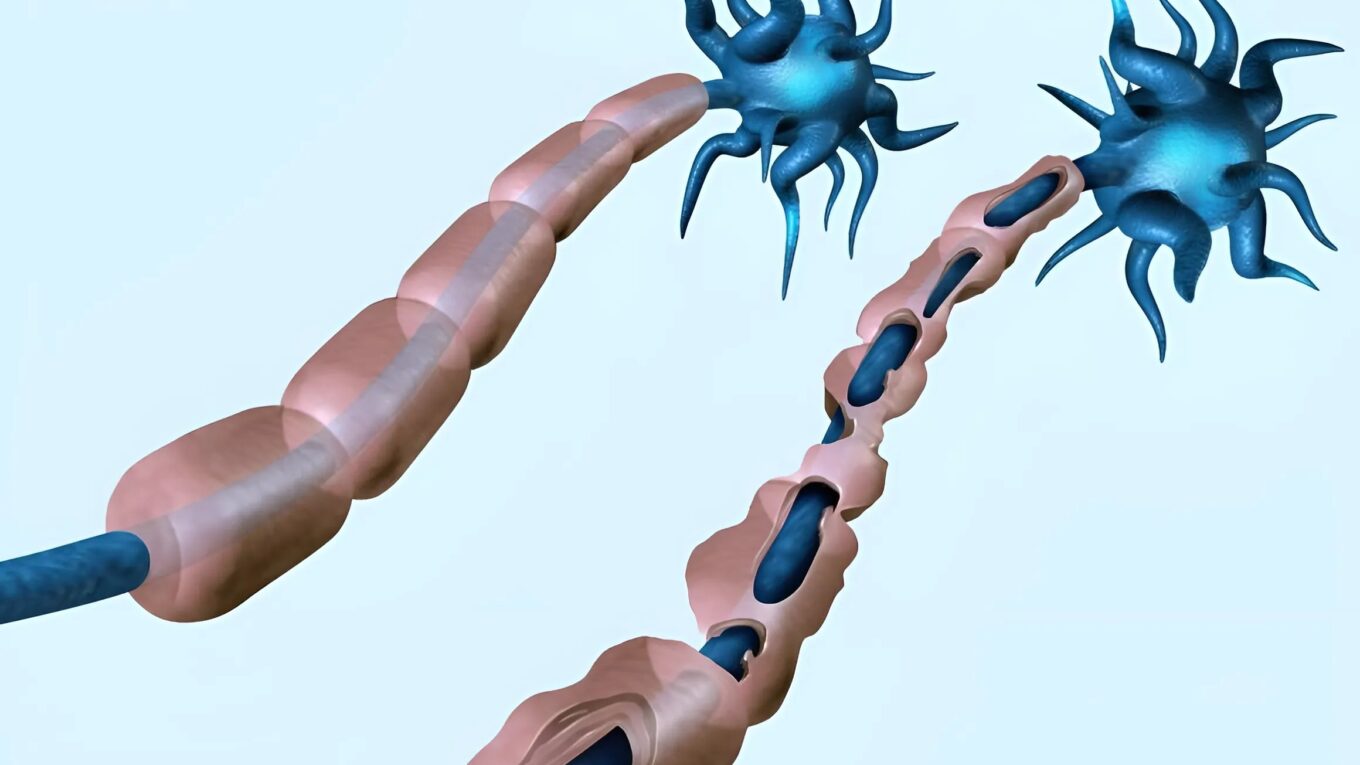Click here to Visit Facebook Page
Introduction:
Understanding Multiple Sclerosis. Multiple Sclerosis (MS) is a chronic, often disabling disease that affects the central nervous system (CNS), which includes the brain and spinal cord. It is characterized by the immune system attacking the protective sheath (myelin) that covers nerve fibers, leading to communication problems between the brain and the rest of the body. This can eventually cause the nerves themselves to deteriorate or become permanently damaged.
Click here to Visit Facebook Page
What is Multiple Sclerosis?
Multiple Sclerosis is an autoimmune disorder, which means the body’s immune system mistakenly attacks its own tissues. In MS, the immune system attacks the myelin sheath, the fatty material that insulates nerve fibers, leading to inflammation and damage. This damage disrupts the ability of the nerves to conduct electrical impulses to and from the brain and spinal cord, resulting in a wide variety of symptoms.
Click here to Visit Facebook Page
Types of Multiple Sclerosis:
MS can manifest in different forms, each with its own set of characteristics:
1. Relapsing-Remitting MS (RRMS):
– The most common form, affecting about 85% of people diagnosed with MS.
– Characterized by clearly defined attacks of new or increasing neurologic symptoms (relapses) followed by periods of partial or complete recovery (remissions).
2. Secondary Progressive MS (SPMS):
– Initially presents as RRMS but transitions to a phase where there is a progressive worsening of neurologic function over time.
3. Primary Progressive MS (PPMS):
– Characterized by steadily worsening neurologic function from the onset of symptoms, without early relapses or remissions.
4. Progressive-Relapsing MS (PRMS):
– The least common form, involving steadily worsening neurologic function from the beginning with occasional relapses.
Click here to Visit Facebook Page
Symptoms of Multiple Sclerosis:
The symptoms of MS vary widely depending on the location and extent of myelin damage in the CNS. Common symptoms include:
– Fatigue: A common and often debilitating symptom.
– Numbness or Tingling: Often in the face, body, or extremities.
– Walking Difficulties: Due to muscle weakness, spasticity, or balance issues.
– Muscle Spasms and Spasticity: Stiffness and involuntary muscle contractions.
– Vision Problems: Blurred or double vision, partial or complete loss of vision (often in one eye at a time), usually with pain during eye movement.
– Bladder and Bowel Dysfunction: Urgency, frequency, or incontinence.
– Cognitive Changes: Memory problems, difficulty concentrating, or processing information.
– Pain: Neuropathic pain and musculoskeletal pain.
Click here to Visit Facebook Page
Causes and Risk Factors:
The exact cause of MS is unknown, but it is believed to result from a combination of genetic predisposition and environmental factors:
– Genetics: Having a family history of MS increases the risk.
– Infections: Certain viral infections have been linked to MS, including Epstein-Barr virus (EBV).
– Vitamin D Levels: Low levels of vitamin D and living farther from the equator are associated with a higher risk.
– Smoking: Smokers are more likely to develop MS and have a more severe course of the disease.
– Gender: Women are two to three times more likely to develop MS than men.
– Age: Most people are diagnosed between ages 20 and 50.
Click here to Visit Facebook Page
Diagnosis of Multiple Sclerosis:
Diagnosing MS can be challenging as symptoms often mimic other conditions. A comprehensive diagnostic process includes:
1. Medical History and Neurological Exam: Detailed history of symptoms and a thorough neurological examination.
2. Magnetic Resonance Imaging (MRI): Detects lesions in the brain and spinal cord.
3. Lumbar Puncture (Spinal Tap): Analyzes cerebrospinal fluid for abnormalities associated with MS.
4. Evoked Potential Tests: Measure electrical activity in the brain in response to stimuli to detect slowed nerve responses.
5. Blood Tests: Rule out other conditions with similar symptoms.
Click here to Visit Facebook Page
Treatment and Management
While there is no cure for MS, various treatments can help manage symptoms, reduce relapses, and slow disease progression:
1. Disease-Modifying Therapies (DMTs): Medications that reduce the frequency and severity of relapses and delay progression. Examples include interferon beta, glatiramer acetate, and newer oral medications like fingolimod and dimethyl fumarate.
2. Relapse Management: Corticosteroids are commonly used to reduce inflammation during acute relapses.
3. Symptom Management: Various medications and therapies address specific symptoms like muscle spasticity, pain, fatigue, and bladder issues.
4. Rehabilitation: Physical therapy, occupational therapy, and speech therapy help maintain function and improve quality of life.
5. Lifestyle and Supportive Care: Healthy diet, regular exercise, stress management, and support groups are vital for overall well-being.
Click here to Visit Facebook Page
Living with Multiple Sclerosis:
Living with MS poses physical, emotional, and psychological challenges. Here are some strategies to help manage life with MS:
– Stay Informed: Educate yourself about MS and stay up-to-date with new treatments and research.
– Build a Support Network: Connect with family, friends, healthcare providers, and MS support groups.
– Prioritize Self-Care: Maintain a healthy lifestyle, manage stress, and ensure adequate rest.
– Adapt and Plan: Make necessary adjustments in your daily routine and environment to accommodate changing abilities.
Click here to Visit Facebook Page
Research and Future Directions:
Research in MS is ongoing, focusing on understanding the disease mechanisms, discovering new treatments, and ultimately finding a cure. Advances in immunology, genetics, and neurobiology are paving the way for innovative therapies. Clinical trials are crucial for testing new drugs and treatment strategies.
Conclusion:
Multiple Sclerosis is a complex and unpredictable disease, but with proper management and support, individuals with MS can lead fulfilling lives. Ongoing research and advancements in medical science continue to bring hope for better treatments and ultimately a cure for this challenging condition. If you or a loved one is affected by MS, staying informed and connected to a supportive community can make a significant difference in navigating the journey with this disease.





